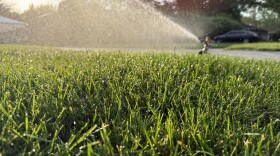The Des Moines area’s first-ever lawn watering ban has been in effect for over a week. Central Iowa Water Works (CIWW) said compliance reduced demand by over 30%, allowing the regional utility to keep pace with nitrate removal and meet federal standards.
Across the next decade, CIWW plans to increase its treatment capacity by 25% for anticipated population growth.
“Our responsibility is to make sure every last drop that comes out of our faucets meets the federal standards for drinking water. That's our mission,” said Christina Murphy, general manager of West Des Moines Water Works, one of 12 founding members of CIWW, which provides drinking water to 600,000 people.

The U.S. Environmental Protection Agency’s (EPA) threshold for nitrate in public drinking water systems has been 10 milligrams per liter for decades. It was set to prevent blue baby syndrome, a life-threatening condition that causes low oxygen levels in an infant’s blood.
During drought years, nitrates can accumulate in farm fields and then flush out when the rain returns. Murphy said this pattern played out last year after spring rains ended Iowa’s four-year drought. The utility saw a spike in nitrates in the Des Moines and Raccoon rivers, two of the water sources for CIWW.
CIWW’s lawn watering ban went into effect June 12, after 55 days of running the nitrate removal facility at Des Moines Water Works. The facility costs $16,000 per day to operate.
During a follow-up news conference Tuesday, CIWW Executive Director Tami Madsen said cutting lawn watering was “the fastest, most efficient way to reduce demand” since it consumes 40% or more of the water treated by CIWW.
In West Des Moines, Murphy said customers have separate irrigation meters that can be read remotely. Her team began emailing residents as soon as the lawn watering ban went into effect. She said many didn’t know about the ban or were on vacation and wanted to comply.
“I believe we were at 1,800 irrigation accounts [in West Des Moines] that were using over 100 gallons an hour when this started,” Murphy said, “And we're down to 150.”
Madsen said Friday that demand across the system had dropped by over 30%.
Adding and expanding treatment capacity
CIWW is trying to complete projects within the next decade that could add 34.2 million gallons per day of treatment capacity, Murphy said. The estimated cost is $344 million.
“Although our facilities are nitrate resilient, they are not built based on nitrate removal. Central Iowa Water Works is building out to meet demand for population growth,” Madsen said.

The utility’s first priority is doubling treatment capacity at the Saylorville Water Treatment Plant, which uses ultra filtration and reverse osmosis membranes.
During a media event Friday, Kyle Danley, chief operating officer at Des Moines Water Works, stood next to a clear box the size of a box fan. It looked like it was filled with uncooked rice noodles.

Danley plucked one out.
“This is a hollow tube. All of the water’s being pulled through each of these ultra filtration membranes,” he said.
The Saylorville plant has around 1,200 cartridges submerged in a tank for the ultra filtration step, which removes particles larger than 0.01 micrometers, including viruses, bacteria and the giardia parasite.
Ted Corrigan, Des Moines Water Works CEO and general manager, said half of the water then goes through reverse osmosis filtration, which has smaller pores to remove smaller particles, including nitrate.
CIWW anticipates the expansion will be complete in 2029.
CIWW also plans to increase capacity at one of the treatment plants in Grimes, which already has membrane technology, and connect it to the regional network.
Another project still in the early phases of planning is a 12 million gallon per day plant on the west side of the metro. Murphy said geologists are exploring potential sites along the Raccoon River.
More aquifer storage and recovery wells
Several CIWW members already use aquifer storage and recovery wells, which allow plants to store millions of gallons of treated water in the Jordan Aquifer in winter.
“Then during peak times, or frankly, times of high nitrate, we turn those aquifer storage recovery wells on and bring that treated water back to the surface,” Murphy said.
She said the wells are closely monitored for chemistry changes in the water to know “if we’ve used up our storage.”
“You always push more water down, then you're going to pull back out,” Murphy explained.

In Valley View Park in West Des Moines, she pointed out where a new, 2,700-foot-deep aquifer storage and recovery well is being built. Once it’s fully connected and operational, it could hold up to 300 million gallons of treated water.
Crews are building another aquifer storage and recovery well in Des Moines, and a third is being designed in Urbandale, she said.
What about data centers?
Murphy said she fields many questions about data centers and concerns over their water usage. Microsoft, Inc. has five data centers in West Des Moines and is building a sixth.
“Data centers are not our problem,” Murphy said. “We would have had this [lawn watering ban], whether the data centers were here or not. This is a source water quality issue that affects our treatment capacity. It's not a quantity issue.”
Data centers use 2-7% of the demand in West Des Moines, while 40% is used for irrigating lawns, Murphy said.
She added that Microsoft has been a good partner with West Des Moines Water Works and invested over $20 million into projects, including a new water tower and the aquifer storage and recovery well in Valley View Park.

Murphy emphasized that water utilities are limited by geology and hydrology to use different water sources, and each comes with its own challenges. Establishing CIWW as a regional water production authority last year offers more flexibility and resiliency across the whole metro.
For example, she said West Des Moines Water Works generally does not have nitrate issues with its shallow and deep well source water, but it benefits from being able to pull in more water from CIWW during high demand periods. Alternatively, West Des Moines Water Works can help provide water to dilute nitrates from CIWW’s river sources.





